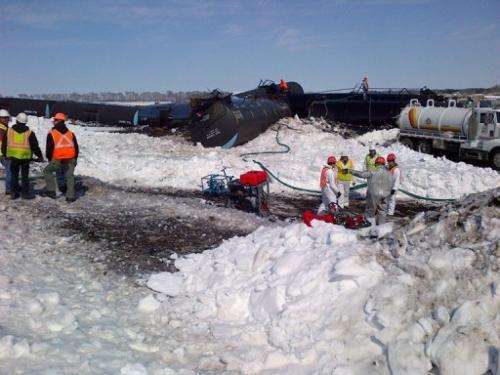Train derailment spills 30,000 gallons of oil in Minnesota

Crews were working Thursday to clean up as much as 30,000 gallons of oil that spilled onto a Minnesota field after a mile-long train derailed.
It was not yet clear whether the Canadian Pacific train was transporting regular crude or oil from the Alberta tar sands, but the spill will certainly add fuel to the fight against the controversial Keystone XL pipeline.
Luckily, frigid temperatures helped contain the environmental damage after 14 train cars fell off the tracks and three began leaking oil on Wednesday morning.
"Minnesota is having a late spring and the site is still frozen and covered with quite a lot of snow, which helped prevent any oil from moving down the ditch or soaking into the soil," said Dan Olson, a spokesman for the Minnesota Pollution Control Agency."
"The accident currently poses no threat to either surface or ground waters."
The bulk of the oil spilled from a single tank, which lost a "substantial amount" of its 26,000 gallon capacity, Olson told AFP. Two other tanks were leaking more slowly and the spill was estimated at 20,000 to 30,000 gallons.
No injuries were reported as a result of the derailment in a rural area about a mile north of Parkers Prairie in west central Minnesota, the Otter Tail county sheriff's office said.
Environmental activists are preparing to flood an April 18 public hearing in Nebraska to discuss the controversial $5.3 billion Canada-to-Texas Keystone XL pipeline.
The US State Department released a draft environmental impact statement on March 1 suggesting the rerouted pipeline, which would transport some 830,000 barrels a day, would have no major impact on the environment.
Critics contend that the heavy tar sand oil would be nearly impossible to clean up if it were to spill in one of the more than 1,000 waterways that will be traversed by the pipeline, because it sinks instead of floats.
The exploitation of the tar sands also results in significantly more greenhouse gas emissions than traditional oil extraction because it must be dug out of the ground and then basically melted with the heat of natural gas.
(c) 2013 AFP





















